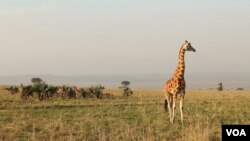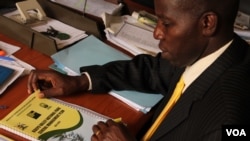KAMPALA —
For decades, conflict and insecurity made Uganda's Kidepo National Park all but inaccessible to tourists. Even today, expensive flights and terrible roads put off all but the most adventurous visitors. But Ugandan authorities have now mounted a plan to open up the park to the wider world.
This year CNN ranked Kidepo National Park - a remote stretch of savannah in northeastern Uganda - as the third best park in Africa. On its website, the American network raved about the park’s wildlife and picturesque setting.
But another draw is Kidepo’s exclusivity, it said, as only a handful of visitors have ever been there.
Until about five years ago, Kidepo was a virtual no-go area. But now the Ugandan government is determined to open it up to the world.
The park lies just north of Karamoja, a region that has long had a reputation for lawlessness and violence. To the west lies the land terrorized for decades by the rebel Lord’s Resistance Army.
Its location means that Kidepo has been essentially cut off from the capital for decades, although longtime tour guide Amos Wekesa, who now runs his own tour company, said he used to take visitors there all the same.
“These were extreme risk-takers. I used to take people there under such circumstances, but we always had to make sure we were in a convoy. We had security with us. We could gather in Kotido and have 20 cars following each other. It was a very volatile environment at that time," said Wekesa.
In the past five years the people of Karamoja have been largely disarmed, and the LRA has moved into neighboring countries. Stephen Masaba of the Uganda Wildlife Authority said millions of dollars are about to be poured into marketing Kidepo and improving its infrastructure.
“Security has tremendously improved, and that’s why we’re able to do a lot of these things. We are getting out of the long historical bad days, and we are slowly but surely getting there - putting in place systems that give you access, putting in place gate systems, putting in place systems that can enable you to enjoy. We hope this will turn around the fortunes of Kidepo," said Masaba.
Wekesa said this represents a shift on the part of a government that has, until now, focused more on agriculture than tourism development.
“They realize that we are earning a lot of money, and we have a treasure. This is one of the greatest countries in the world in terms of biodiversity. But we have not been able to tap into it, and they realize we should tap into it," he said.
But there are still challenges. Even with improved security Kidepo is difficult to reach. Flights from the capital are expensive, and according to tour guide Noel Bayo, bad roads mean it can take two days just to reach the gate.
“When they get to Kidepo they love the place. But of course, you can understand their frustrations when you get stuck on the road and they have to push, and it’s muddy. This is where the frustration creeps in," said Bayo.
The government says it has plans to upgrade the roads around the park. Already, says Wekasa, tourism numbers have been rising, even if fewer than two percent of Uganda’s visitors make it to Kidepo every year.
“The thing is, it was starting from nowhere. So the percentages have been so high - 100 percent, 200 percent. Everyone that goes to Kidepo thinks it’s the most beautiful national park they have been to. I’m sure in the next five years it will grow by 1000 percent," he said.
By then the park might lose some of its prized exclusivity. But that is exactly what the Ugandan government is hoping for.
This year CNN ranked Kidepo National Park - a remote stretch of savannah in northeastern Uganda - as the third best park in Africa. On its website, the American network raved about the park’s wildlife and picturesque setting.
But another draw is Kidepo’s exclusivity, it said, as only a handful of visitors have ever been there.
Until about five years ago, Kidepo was a virtual no-go area. But now the Ugandan government is determined to open it up to the world.
The park lies just north of Karamoja, a region that has long had a reputation for lawlessness and violence. To the west lies the land terrorized for decades by the rebel Lord’s Resistance Army.
Its location means that Kidepo has been essentially cut off from the capital for decades, although longtime tour guide Amos Wekesa, who now runs his own tour company, said he used to take visitors there all the same.
“These were extreme risk-takers. I used to take people there under such circumstances, but we always had to make sure we were in a convoy. We had security with us. We could gather in Kotido and have 20 cars following each other. It was a very volatile environment at that time," said Wekesa.
In the past five years the people of Karamoja have been largely disarmed, and the LRA has moved into neighboring countries. Stephen Masaba of the Uganda Wildlife Authority said millions of dollars are about to be poured into marketing Kidepo and improving its infrastructure.
“Security has tremendously improved, and that’s why we’re able to do a lot of these things. We are getting out of the long historical bad days, and we are slowly but surely getting there - putting in place systems that give you access, putting in place gate systems, putting in place systems that can enable you to enjoy. We hope this will turn around the fortunes of Kidepo," said Masaba.
Wekesa said this represents a shift on the part of a government that has, until now, focused more on agriculture than tourism development.
“They realize that we are earning a lot of money, and we have a treasure. This is one of the greatest countries in the world in terms of biodiversity. But we have not been able to tap into it, and they realize we should tap into it," he said.
But there are still challenges. Even with improved security Kidepo is difficult to reach. Flights from the capital are expensive, and according to tour guide Noel Bayo, bad roads mean it can take two days just to reach the gate.
“When they get to Kidepo they love the place. But of course, you can understand their frustrations when you get stuck on the road and they have to push, and it’s muddy. This is where the frustration creeps in," said Bayo.
The government says it has plans to upgrade the roads around the park. Already, says Wekasa, tourism numbers have been rising, even if fewer than two percent of Uganda’s visitors make it to Kidepo every year.
“The thing is, it was starting from nowhere. So the percentages have been so high - 100 percent, 200 percent. Everyone that goes to Kidepo thinks it’s the most beautiful national park they have been to. I’m sure in the next five years it will grow by 1000 percent," he said.
By then the park might lose some of its prized exclusivity. But that is exactly what the Ugandan government is hoping for.





